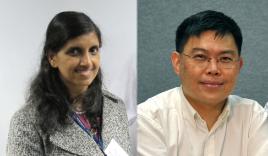Better diet 'apps' an appetising goal but researchers have plenty to chew over
Published on 25 August, 2011
More than a billion overweight and obese people would lead healthier lives and governments could save billions of dollars in health costs, if people were able to stick to their recommended dietary intake. So it's no surprise people have already been producing computer 'apps' to help monitor dietary intake.
So far, no-one has really cracked the full complexity of the task and the desired results are not being achieved.

Dr Mary Tom and Dr Andrew Chiou, scoping a better way to guide people's eating habits
Researchers at CQUniversity are keen to pioneer a more holistic approach to provide technology assistance for planning and scheduling meals, not just monitoring food intake.
Showcasing the potential of collaboration between staff at regional and metro campuses, Dr Mary Tom (Brisbane) and Dr Andrew Chiou (Rockhampton) are looking at what's required to produce a 'ubiquitous intelligence system' for personal diet formulation and maintenance.
"Compared to advanced technologies available to industries for large scale production and globalised marketing of food products and beverages, consumers are poorly equipped to formulate, monitor and control their food purchases and consumption," Dr Tom says.
"The detailed analysis conducted in this study reveals many intellectual tasks involved in meals scheduling and diet formulation."
Dr Tom says the focus is on automating choices, whether people are making meals at home, mixing home-made and purchased food, or eating away from home.
"Typically, Recommended Dietary Intake (RDI) is the guideline for the amounts of specific nutrients required on average on a daily basis for sustenance or avoidance of deficiency states. It varies between individuals based on their age and body mass index."
Dr Tom says there's major complexity required in formulating and following a balanced diet meeting the stipulated RDI.
"This study recommends a Ubiquitous Intelligence System, named Dietary Intelligence System (DIligenS), that can provide intelligence, knowledge and assist in informed decision making for formulation and maintenance of healthy balanced diet."
The system has to facilitate: Formulation of meals schedule for meeting the set RDI; Automatic data collection of food and grocery purchases; Automatic collection of NI and IL of processed food; Verification of the suitability of a processed food item before purchase; Messaging to inform healthy food choices; Advice on best possible use of available groceries; Advice on healthy food purchases from food outlets; Alerts and Warning messages; and Statistical reports on food consumption.
There's also complexity relating to constraints of each user, considering: Available Time to prepare; Available ingredients or availability; Urgency to use items to be expired; Health constraints; Individual preferences; and Available budget.
Brisbane-based Masters student Vikas Jagtap will advance the project to the next phase.

